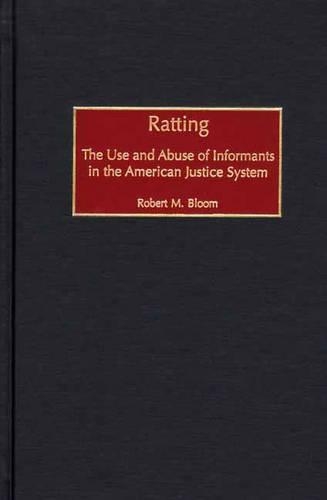
Ratting: The Use and Abuse of Informants in the American Justice System
(Hardback)
Publishing Details
Ratting: The Use and Abuse of Informants in the American Justice System
By (Author) Robert M. Bloom
Bloomsbury Publishing PLC
Praeger Publishers Inc
30th May 2002
United States
Classifications
Tertiary Education
Non Fiction
363.2520973
Physical Properties
Hardback
216
Description
Showing informants in a variety of contexts provides a broader picture of them, and highlights the potential pitfalls associated with their use within our criminal justice system. Police depend on insiders to prosecute the perpetrators of many of the so-called victimless crimes like drug dealing, money laundering and political corruption. As victimless crimes have grown, so has the use of informants. Providing insights into law enforcement techniques as well as the Court's response to them, Bloom illuminates the pernicious legal ramifications that can result from the justice system's relationship to and use of informers. Law professors, criminologists, and law enforcement scholars will find Bloom's account of this much used and abused but under-reported aspect of America's law enforcement efforts both edifying and sobering. There are different kinds of informants. Some are used to infiltrate and destroy organized crime operations, and others, such as Linda Tripp, are used to investigate government officials. Informants are motivated by a variety of reasons, including financial gain, political power, elimination of competition, and avoiding criminal punishment. Some are even imaginary, fabricated by police to justify their activity. Bloom discusses each type of informer, grounding his commentary in real cases, some well known, others obscure. He then concludes by suggesting how potential and real abuses of the informant system can be curbed.
Reviews
By overlooking illegal conduct or granting immunity to unsavory informers, does the government compromise itself and foster crime Does payment of recruited informers encourage fabrication of evidence and thus further compromise public authority The author addresses these and other important questions through case studies, beginning with an account of the activities of Linda Tripp, the incidental informer whose revelations almost toppled President Clinton. He then examines the importance of informers historically and analyzes their use (and abuse) in different settings. The result is a superb book, accessible to general readers, informative to scholars, and useful to practitioners. Highly recommended. General readers; upper-division undergraduates and above.-Choice
"By overlooking illegal conduct or granting immunity to unsavory informers, does the government compromise itself and foster crime Does payment of recruited informers encourage fabrication of evidence and thus further compromise public authority The author addresses these and other important questions through case studies, beginning with an account of the activities of Linda Tripp, the incidental informer whose revelations almost toppled President Clinton. He then examines the importance of informers historically and analyzes their use (and abuse) in different settings. The result is a superb book, accessible to general readers, informative to scholars, and useful to practitioners. Highly recommended. General readers; upper-division undergraduates and above."-Choice
Author Bio
ROBERT M. BLOOM is Professor of Law at Boston College Law School. He has written extensively in the area of criminal procedure, focusing on police abuses and the Fourth Amendment.
